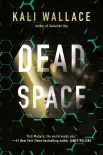Dead Space Kali Wallace (best non fiction books to read txt) 📖

- Author: Kali Wallace
Book online «Dead Space Kali Wallace (best non fiction books to read txt) 📖». Author Kali Wallace
The Overseer wasn’t stopping them. Every control panel still said the same thing.
Steward systems maintenance requested.
It was not going to do what we wanted. It had its own ideas.
“Come on!” Adisa said, reaching for my arm.
A sharp pain in my leg: one of the spiders had punctured my trousers.
The Overseer was not going to let me go.
I didn’t take Adisa’s hand. Instead I shoved him backward with a single, solid push, just enough to get him out of the doorway.
“Go! Find the others!”
The door slid shut before he could respond, crushing several spiders with a loud series of pops and metallic squeals. I tumbled backward, caught myself, turned. The bots were stretching their gossamer-thin legs to form a broad net around me, a rippling and waving trap that spanned the room. It was strangely beautiful, almost organic in the way it moved, and for a second—for a fraction of a second—I was mesmerized.
There was a snapping sound. A wave of that chemical scent. A flare of light to one side. That fraction of a second had been too long. The bots were going to ignite.
I didn’t give myself time to think. I charged through the net and ran for Ops.
I was only a few meters into the corridor when the first explosion flared behind me. It came with a flash of light and noise, and a painful full-body blow on my back. I hit the floor so hard every bone in my body rattled, and I slid along the corridor for several meters. The second explosion followed swiftly, and everything was blinding light and agonized, deafening shrieks of metal bending, and heat—the heat was intense and unbearable—but I scrambled to my feet and ran, and somewhere beneath the cacophony I was shouting, “Let me in, you piece of shit, let me in, let me in,” and it wasn’t listening, the fucking Overseer wasn’t listening to me, the door was closed. I was two meters away and it was closed. One meter and it was closed. I slammed into the wall, hunched over the panel, jabbed in my access code with shaking hands. The heat was going to burn through my clothes, through my skin, it was going to swallow me whole before I could even scream.
The door slid open silently.
I dove through the doorway as another explosion shuddered through the corridor. For a second there was nothing but fire and light and pain. The tortured sound of metal crushing metal. So much noxious chemical mist in the air I choked on it.
Then the lights were gone, the heat too, and everything was silent.
NINETEEN
They told me I couldn’t remember.
It was impossible, said the doctors, in their endless declarations about what could be allowed within the confines of my own mind and the limits of my own damaged body.
I had been asleep when the accident occurred. After I bid good night to Sunita, I had tucked myself into my uncomfortable coffin-like bunk to spend an hour or so making notes on the day’s work. I amicably shared the passenger berth with another scientist, a biologist for the Titan project, but she had been working nights in her own laboratory, monitoring a delicate experiment with a purpose she was happy to explain but I only partly understood. Nobody’s work stopped en route to Titan; it only accelerated. The feeling among the project members was that we needed to use every possible second so that we might hit the ground running. Even after I put my PD away and turned off the lights, my mind was racing. I did not think I would be able to fall asleep. I had been having trouble sleeping since we left Earth. I told myself it was excitement; there was so much to do, all of it important, all of it brilliant. In retrospect I wondered if it might have been fear. Even though I had been preparing for the journey for years, it felt as though there had never been a moment when I had truly considered what it meant to leave Earth without knowing when I would be coming back—if I would ever come back.
I must have fallen asleep, because I woke to the wailing of the ship’s alarms. There were alarms for decompression, radiation, fire, all of them shrieking a monstrous symphony of confusion and failure. I woke to searing heat and dust-choked air. I woke to shouts and screams. I woke to the sensation of flying, falling, striking a wall, falling again.
Oh, no, said the doctors, much later, in the claustrophobic trauma ward on Badenia. That wasn’t possible. There was no way I could remember. My injuries were too severe. I would have lost consciousness immediately. I was lucky to be alive. Lucky to have made it. So very lucky.
But I did remember. I remembered opening my eyes to a churning abyss of red dotted by silhouettes of black. I remembered the roar of explosions and the piercing sting of screams. I remembered the pain.
I learned later, when the investigation findings began to trickle into public view, that the Black Halo members embedded on Symposium had not meant to fully destroy the ship. They meant only to disable it, but they had set off a bomb in the propulsion system that created a cascade of explosions, each larger than the last, which spread from the engines into the fuel system, from the fuel system into the atmosphere and electrical systems, along the way sparking hundreds of fires that the suppression system had no hope of controlling. The larger explosions punched holes in the hull; the smaller ones spread unchecked through maintenance shafts and walls, melting electronics into useless slag, turning oxygen supply lines into deadly bombs, filling the air with





Comments (0)